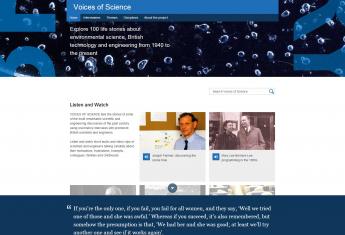Voices of Science - The lives of British scientists recorded in a new British Library oral history archive

"If you’re the only one, if you fail, you fail for all women, and they say, ‘Well we tried one of those and she was awful.’ Whereas if you succeed, it’s also remembered, but somehow the presumption is that, 'We had her and she was good; at least we’ll try another one and see if it works again'.
Dame Stephanie Shirley
The interview with computer scientist, entrepreneur and philanthropist Dame Stephanie Shirley is one of over a hundred conversations with scientists, explorers and engineers about their lives and scientific careers. Joseph Farman tells the story of finding the ‘hole’ in the ozone layer while working in a hut near the South Pole. Janet Thomson remembers how she became the first female scientist allowed to Antarctica with the British Antarctic Survey - as late as 1983. Mary Lee Berners-Lee relates how women programmers in the 1950s demanded equal pay. Geoff Tootill, who built the world's first modern computer in 1948, remembers how he and his colleagues thought the whole world would only need a few of those “Manchester Babies”. And Sir Colin Humphreys explains how he used his scientific mindset to investigate the events of the Bible.
All those interviews are part of an impressive project launched in November 2013 by the British Library: “Voices of Science” tells the stories of some of the most remarkable scientific and engineering discoveries of the past century. The scientists talk about their motivations, frustrations and triumphs, as well as their colleagues, families and childhoods, and the social, economic and political circumstances under which their researches, inventions and discoveries took place. Additional information is given by personal biographies, photographs and links which provide the context for each scientist’s life and work.
Curator Dr Rob Perks comments: “Voices of Science provides unique insights, not only into British scientific and engineering discovery and innovation, but importantly into the lives of the scientists and engineers themselves. What makes them tick? What in their childhoods and education made them scientists? Do they think and behave differently from the rest of us? How has the everyday practice of science changed over the past 75 years? As the collection grows we hope to document every facet of British science and engineering within living memory: creating an important human resource for schools, academics and anyone interested in the world around us.”
“Voices of Science” presents a small part of the rich oral history collection of the British Library which all in all holds over a million discs, 200,000 tapes, and other sound and video recordings from all over the world and covering all imaginable themes and disciplines from music, drama and literature to wildlife sounds. “Voices of Science” is a fascinating project and an immense historical resource which offers background information to the works – and books – that have become milestones in science and history.
Click here for more detailed information:
>>> Voices of Science
